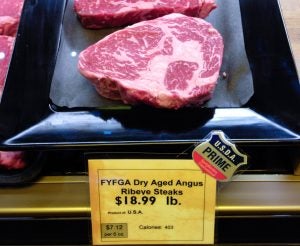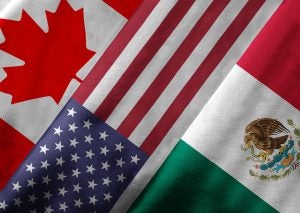The Mandatory Country of Origin Labeling (MCOOL) requirement is a conversation topic that shouldn’t be brought up during holiday dinners or other festive events because of how hotly debated it is, especially within the beef industry.
With such a sensitive topic comes a lot of emotion and misunderstanding. Everyone wants what is best for the beef industry (cue the blame against the Big Four packers), but everyone has a different perspective on what that should look like.
The truth is that there isn’t a black and white fix to solve the woes of the beef industry. What works for some, won’t work for others.
MCOOL was first introduced in the 2002 Farm Bill. Inside that bill is the Agricultural Marketing Act of 1946. This was amended in both the 2002 and 2008 Farm Bills and required retailers, like grocery stores and supermarkets, to better inform consumers about the origin of foods such as nuts, fruits, veggies, and meat. The suppliers were charged with the responsibility of providing this knowledge to the retailers.
For the past 20 years, this ruling has been met with different amendments and a back and forth over which products should be covered and which of those should be exempt. Beef and pork were made exempt in 2015, while most other products still fall under the law.
In late 2021, Senate Bill 2716, the American Beef Labeling Act, was introduced by U.S. Sens. Cory Booker, John Thune, Jon Tester, and Mike Rounds. This law, the senators hope, will require beef to finally follow MCOOL requirements.

Since talks about enforcing MCOOL have arisen again, with the House’s own version of the American Beef Labeling Act introduced, it’s crucial to understand what some of the pros and cons are about labeling our country’s beef.
This is a polarizing issue, and one that can’t be taken lightly. Regardless of how anyone feels about this, it’s always good to understand both sides of the issue — and to know how it can affect all parts of the industry.
Pro: Clearly labeled products provide better consumer trust in the product. Knowing exactly where their food comes from is not only a trending concern, but also an opportunity for American ranchers to sell their premium products. Producers and consumers need more transparency and trust in their food.
Con: This law could be against compliance with The World Trade Organization, which oversees whether nations are following their trade agreements. In particular, Mexico and Canada are two countries that would find issues with MCOOL and could impose tariffs and other means of reprimand against the industry (It is important to note that the proposed amendment seeks ways to become compliant with WTO policies but hasn’t confirmed how, and declares it will go ahead with the requirement regardless).

Pro: With more concerns about Bovine Spongiform Encephalopathy (BSE, or “mad cow disease” as it is infamously referred) from Brazilian, and other foreign markets, having clear labeling can help prevent unsafe food from entering into the chain.
Con: In the past, mandatory labeling didn’t provide a great return on investment for ranchers and consumers. Many consumers didn’t care enough to purchase USA beef anyway, as they worried more about quality and price. It added unnecessary costs, and government mandated requirements are not always ideal in solving problems.
Pro: Any beef that may have been labeled as “Product of the USA” even though it wasn’t raised here, wouldn’t be so confusingly labeled. Only beef raised and slaughtered in the USA would get this privilege.
Con: Cory Booker, one of the four U.S. senators who proposed this bill, is a known vegan and has introduced bills that would end Concentrated Animal Feeding Operations (CAFOs) in recent years. While not something to hold against him entirely, it is concerning that this could be a means to an end for animal agriculture.

For some, reinstating MCOOL would help provide more competitive markets for USA producers, and establish better demand for American beef. For others, MCOOL is a burden that won’t solve the problems our industry faces.
The hope is that, however this decades-long debate ends, the American producer and consumer base will benefit from whatever the end result may be. The industry is already divisive enough, and has plenty more battles to fight.
Markie Hageman majored in agribusiness at Fort Hays State University. She is actively involved in her state Cattlemen’s Association, Young Farmers chapter, and National Cattlemen’s Beef Association. Her AGDAILY.com articles can be found here.



